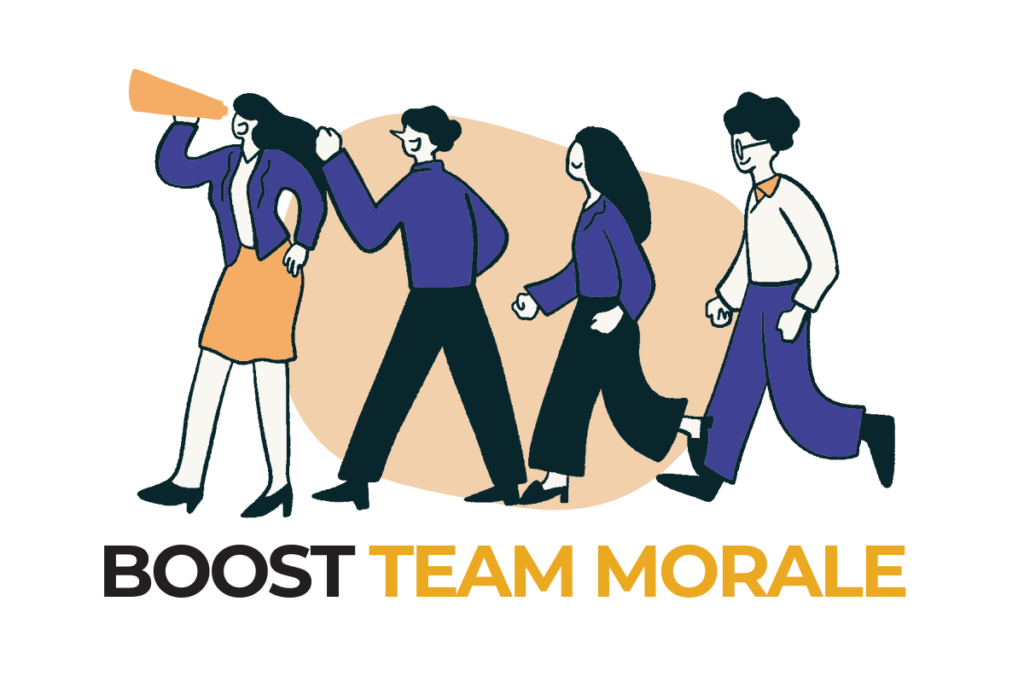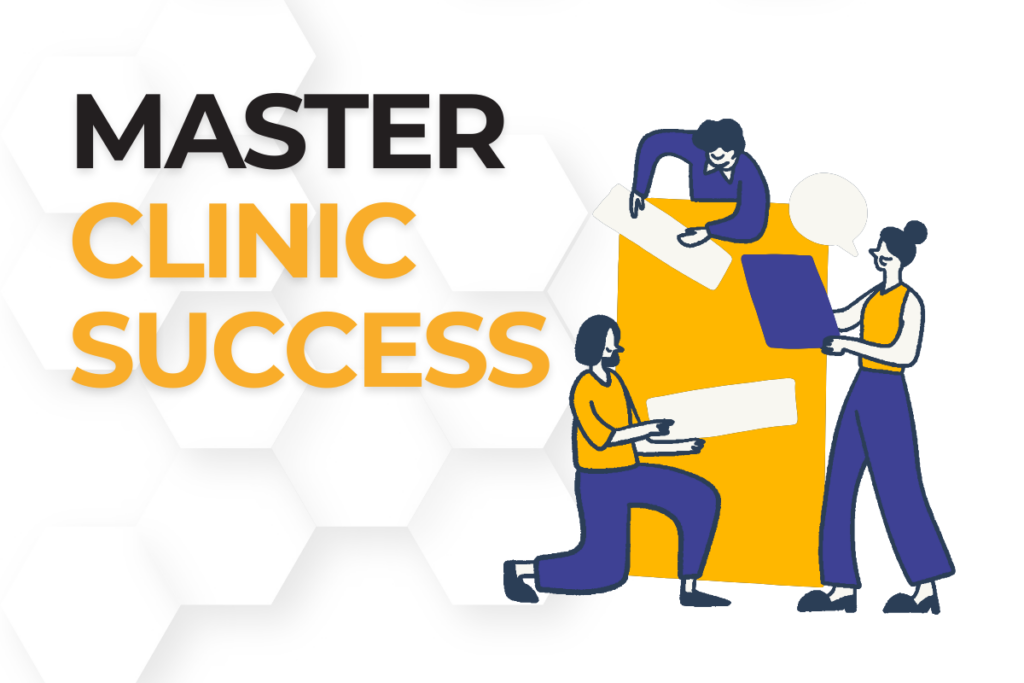Boost Efficiency and Grow Your Clinic: 7 Key Management Skills Every Massage Therapy Clinic Owner Needs
Running a massage therapy clinic is no easy task. In fact, 70% of small business owners report facing significant management challenges, and the world of massage therapy is no exception. As a clinic owner, you’re not just focused on providing exceptional client care—you also have to lead a team, manage daily operations, ensure financial stability, and consistently plan for growth. The pressure to wear all these hats can be overwhelming, often leading to burnout, high employee turnover, inefficiencies in operations, and, ultimately, dissatisfied clients.
Without strong management skills, even the most passionate and talented clinic owners can find themselves struggling to maintain balance. The demands of overseeing bookings, staff performance, client satisfaction, and the clinic’s financial health can feel like a constant juggling act, leaving little room for strategic thinking and growth. Worse yet, neglecting key management duties can create an unhealthy work environment, causing therapists to feel unmotivated and disengaged.
But the good news is that with the right strategies in place, you can turn these challenges into opportunities for growth. In this article, we’ll explore the seven essential management skills every massage therapy clinic owner needs to master. From improving communication with your team to mastering delegation and enhancing time management, these practical tips will help you streamline operations, keep your staff motivated, and ensure your clinic thrives in a competitive market. Whether you’re just starting out or looking to refine your approach, these strategies will set you up for long-term success.
Embrace the Transition: From Massage Therapist to Effective Clinic Manager
The Shift in Roles
Many clinic owners begin their careers as massage therapists, spending years providing hands-on treatments and building close relationships with clients. However, when transitioning from therapist to clinic manager, they face an entirely new set of challenges. As a manager, the focus shifts from directly delivering client care to overseeing clinic operations, leading a team, managing finances, and making critical business decisions. This transition can be overwhelming, especially when you’re still involved in treating clients and trying to handle managerial duties simultaneously.
The skills that made you an excellent therapist—empathy, attention to detail, and client care—are invaluable, but they must now be expanded to include leadership, strategic thinking, and business acumen. Managing a team and maintaining the clinic’s long-term success requires a new mindset and a refined approach to daily operations.
Balancing Both Roles
One of the most difficult aspects of this transition is balancing your dual roles as therapist and manager. Trying to do everything yourself—booking clients, managing staff, handling administrative tasks—can quickly lead to burnout and operational inefficiency. To grow a thriving business, it’s crucial to delegate non-therapeutic tasks to trusted staff members or an administrative team. By letting go of some responsibilities, you free up valuable time to focus on high-level strategies that will help your clinic grow and succeed.
Real-World Example: Managing Both Roles
Take Sarah, for example, a clinic owner who was initially managing every aspect of her business while still treating clients three days a week. Sarah found herself overwhelmed, unable to dedicate the time needed for management tasks like staff development, financial planning, and client retention strategies. To regain control of her time, she hired a part-time administrator to handle bookings, client communication, and general office tasks. This allowed her to focus on managing her team, ensuring smooth clinic operations, and thinking strategically about growing her business.
By delegating non-essential duties, Sarah not only reduced her stress but also had more energy to focus on delivering quality care to her clients and taking her clinic to the next level. This balance of roles allowed her clinic to flourish and her team to feel more supported.
Actionable Tips for Embracing the Transition
- Redefine Your Role: Accept that your role as an owner involves more than just client care. Shift your mindset to view yourself as a leader who shapes the future of the clinic.
- Delegate to Elevate: Identify the tasks that can be delegated, such as administrative duties or marketing, and empower trusted staff to take ownership.
- Invest in Management Skills: Consider leadership training or mentorship to build confidence in managing a team and growing your business.
- Schedule Dedicated Management Time: Block out specific days or hours for managerial tasks, allowing yourself to focus fully on operational decisions without client interruptions.
By embracing the transition and understanding that success in business requires both operational oversight and client care, you’ll set your clinic up for sustainable growth while reducing stress for yourself.
Master Communication to Boost Team Productivity and Morale
Why Communication Matters
Clear, consistent communication is the foundation of any successful clinic, directly impacting team productivity, morale, and client satisfaction. As a clinic owner, it’s your responsibility to ensure that your staff understands the clinic’s goals, expectations, and standards. Effective communication not only prevents misunderstandings but also fosters a collaborative work environment where staff feel valued, heard, and motivated. When communication falters, it can lead to confusion, frustration, decreased morale, and even higher staff turnover. Conversely, a well-communicated vision and transparent feedback channels keep everyone aligned and committed to shared goals.
Effective communication also builds trust among team members, ensuring that they feel comfortable raising concerns, sharing ideas, and providing feedback. This open dialogue helps your clinic run smoothly, strengthens team bonds, and ultimately enhances the client experience.

Practical Tips for Better Communication
- Host Regular Team Meetings: Weekly check-ins give your team a chance to share feedback, address issues, and stay aligned on goals.
- Use Performance Metrics: Provide constructive feedback based on clear metrics such as client satisfaction or booking efficiency.
- Active Listening: Encourage open communication by truly listening to your team’s concerns and suggestions.
Pro Tip: Implementing a communication tool like Slack or ClickUp can streamline team conversations and project management.
Keep Your Team Engaged: Proven Strategies to Boost Motivation and Retention
Addressing Turnover in Massage Clinics
High staff turnover is a persistent challenge in the massage therapy industry, and it can disrupt the smooth operation of your clinic. Frequent turnover not only leaves gaps in client care but also drives up operational costs as you spend time and resources training new employees. More importantly, turnover can negatively impact the client experience, leading to dissatisfaction and potentially lost business. Employees may leave for a variety of reasons, including burnout, lack of recognition, or limited opportunities for career growth.
However, with the right strategies in place, you can retain top talent and build a loyal, motivated team that is invested in the success of your clinic. By focusing on recognition, development, and work-life balance, you can create a positive work environment that encourages longevity and reduces turnover.
Strategies to Retain Top Talent
- Recognition and Rewards: Acknowledge your therapists’ hard work with small bonuses or public praise during team meetings.
- Offer Continuing Education: Provide opportunities for staff to improve their skills, which shows that you’re invested in their career development.
- Promote Work-Life Balance: Offering flexible schedules and manageable workloads can prevent burnout, leading to higher retention.
Conflict Resolution 101: Addressing Staff and Client Issues with Confidence
The Importance of Conflict Management
In any workplace, conflict is inevitable—whether it’s disagreements between staff members, miscommunication with clients, or issues with clinic policies. For a massage therapy clinic owner, how you handle these conflicts can have a significant impact on your clinic’s atmosphere, team dynamics, and client satisfaction. Poor conflict management can lead to an environment of tension, low morale, and even turnover. On the flip side, effective conflict resolution not only strengthens relationships but also builds a culture of trust, open communication, and respect within your clinic.
By developing strong conflict management skills, you can prevent minor issues from spiraling into bigger problems, and you’ll create an environment where both staff and clients feel heard, valued, and supported. When handled professionally, conflicts can even lead to positive outcomes, such as improved communication and stronger bonds among team members.
Conflict Resolution Techniques
- Establish Clear Policies: Make sure there are well-documented processes for handling internal and external complaints.
- Mediate Disputes: When conflicts arise, mediate a calm discussion where both parties can voice their concerns.
- Act Quickly: Addressing issues promptly prevents small disagreements from escalating into larger problems.

Stop Doing It All: How Delegation Can Improve Efficiency and Prevent Burnout
Why Delegation is Hard
For many massage therapy clinic owners, delegation feels risky. There’s often a fear that no one can perform tasks as well as you can, or that letting go of certain responsibilities might lead to mistakes or a drop in the quality of service. This mindset, while understandable, is one of the most common traps that lead to burnout. Trying to do everything yourself—whether it’s scheduling appointments, managing client follow-ups, or overseeing inventory—quickly becomes overwhelming. Not only does it stretch your time and energy thin, but it also limits your clinic’s potential for growth.
When you’re buried in administrative tasks, you miss out on opportunities to focus on higher-level strategies that could propel your business forward, such as marketing, client acquisition, and staff development. Delegating tasks to trusted team members not only frees up your time but also allows your staff to take on more responsibility, contributing to their own professional growth and enhancing the clinic’s overall efficiency.
Steps to Delegate Effectively
- Identify Tasks to Delegate: Start with administrative tasks like scheduling, client follow-ups, or inventory management.
- Assign Tasks Based on Strengths: Delegate tasks to staff members who are naturally skilled in those areas.
- Trust and Verify: Give your team the autonomy to handle tasks but check in regularly to ensure they’re on track.
Take Control of Your Time: Proven Time Management Strategies for Clinic Owners
The Time Crunch Dilemma
Between managing bookings, overseeing staff, and handling client issues, clinic owners can feel like there aren’t enough hours in the day. Without proper time management, important tasks fall through the cracks, leading to missed opportunities for growth.
Time Management Tips
- Use Scheduling Tools: Utilize platforms like Hivemanager to automate appointment bookings and reminders, saving you time on administrative tasks.
- Time-Block Your Day: Set aside dedicated time for management tasks, client care, and staff check-ins. This prevents task overload.
- Prioritize Important Over Urgent: Focus on tasks that contribute to long-term growth rather than reactive, day-to-day tasks.
Keep Learning: The Importance of Ongoing Management Training
Why Continuous Improvement Matters
Management skills aren’t static. As your clinic grows and evolves, so should your approach to leadership. Staying on top of new management techniques helps you adapt to challenges, keep your team engaged, and improve clinic efficiency.
Resources for Ongoing Growth
- Attend Leadership Workshops: Look for local or virtual workshops focused on small business management.
- Read Leadership Books: Consider reading books like The One Minute Manager to deepen your understanding of effective management.
- Network with Other Clinic Owners: Sharing challenges and solutions with other clinic owners can give you new perspectives on running your business.
Become the Leader Your Clinic Needs
Mastering management skills is not just an optional bonus—it’s a critical foundation for growing your massage therapy clinic into a thriving, sustainable business. As a clinic owner, your ability to lead effectively directly influences every aspect of your clinic’s success, from staff retention and client satisfaction to long-term profitability and growth. By honing key management skills—such as clear communication, strategic delegation, and efficient time management—you can create a work environment where your team feels valued, motivated, and empowered to excel.
When you lead with confidence and clarity, your staff will follow suit, improving the overall client experience and boosting productivity. More importantly, mastering these skills frees up your time and mental energy, allowing you to focus on high-level decisions and future growth strategies rather than being bogged down by day-to-day tasks.
The best part? You don’t need to overhaul everything at once. Start by implementing one strategy at a time, gradually layering in improvements, and watch as your clinic transforms into a more productive, positive, and successful space for both your staff and your clients. Leadership is a journey, and by committing to ongoing improvement, you’ll be well on your way to building a clinic that stands out and flourishes in a competitive industry.
FAQs
Delegation allows clinic owners to focus on high-level management tasks while empowering staff to take on responsibilities that contribute to the clinic’s success. It prevents burnout and increases overall efficiency.
Improve communication by holding regular team meetings, using performance metrics for feedback, and fostering an open environment where staff feel comfortable sharing their concerns and ideas.
You can motivate your team by recognizing their hard work, offering opportunities for continuing education, and maintaining a healthy work-life balance through flexible schedules.
Resolve conflicts by establishing clear policies, mediating discussions between parties, and addressing issues promptly to prevent escalation.



